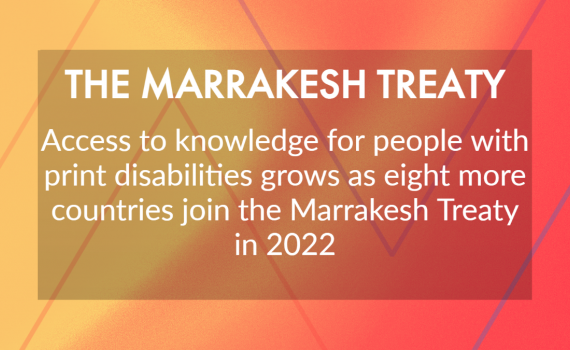
Access to knowledge for millions of people around the world who are blind or otherwise print disabled continued to grow in 2022 with eight more countries - including three EIFL partner countries - joining the Marrakesh Treaty for persons with print disabilities, administered by the World Intellectual Property Organization (WIPO).
The Treaty – full name, Marrakesh Treaty to Facilitate Access to Published Works for Persons Who Are Blind, Visually Impaired, or Otherwise Print Disabled – removes legal barriers to copying books and other copyright-protected works into accessible formats (for example, Braille and digital audio). It also creates an international legal framework that makes it possible for organizations - like libraries - in countries that have ratified the Treaty to share accessible format copies with other countries that have joined the Treaty.
The new ratifications in 2022 bring the total number of countries worldwide that have joined the Marrakesh Treaty since its adoption in 2013 to 117. Of this number, 27 - just over a quarter - are current or former EIFL partner countries. The three EIFL partner countries that joined in 2022 are Armenia, China and Uzbekistan.
As the 10th anniversary of the adoption of the Marrakesh Treaty approaches (27 June 2023), EIFL remains strongly committed to the treaty’s ratification, implementation into national copyright law, and take-up by the local library community to address the dire shortage of accessible reading material for education, employment and social inclusion (known as the ‘book famine’).
EIFL’s support for the Marrakesh Treaty
Since the Marrakesh Treaty was adopted by WIPO member states almost a decade ago, EIFL has been working to encourage ratification and implementation of the Treaty in over 35 developing and transition economy countries, raising awareness among librarians and policy-makers, supporting advocacy efforts, organizing seminars, responding to consultations, and providing technical assistance and practical information. We have also co-authored policy briefings, infographics and position papers with partner organizations.
In 2022, we published a Kenyan edition of the popular guide, ‘Getting Started: Implementing the Marrakesh Treaty for Persons with Print Disabilities: A Practical Guide for Librarians’. The Kenyan edition, adapted for national law, was checked by the Kenya Copyright Board (KECOBO), and additional information was provided by EIFL’s partner, the Kenya Libraries and Information Services Consortium (KLISC). Kenya joined the Marrakesh Treaty in 2017, and in 2019 implemented the treaty into domestic copyright law. Now libraries in Kenya can start using the treaty, and can send and receive accessible format materials from other Marrakesh countries.
We also published an information sheet to help libraries in the European Union (EU) that are supporting Ukrainian refugees with print disabilities. While Ukraine has not yet joined the Marrakesh Treaty, the EIFL information sheet sets out the legal situation with respect to the making and sharing of accessible format materials in Ukraine, and within the EU. Taking an EU member state (Lithuania) as an example, it explains how the Marrakesh Treaty, implemented by the EU in 2018, facilitates the cross-border sharing of accessible books in all 27 EU member states for Ukrainian refugees, as well as in non-EU countries that have joined the treaty.
To round off the year, Teresa Hackett, EIFL Copyright and Libraries Programme Manager, co-authored a book chapter, ‘Success for People with Print Disabilities: The Marrakesh Treaty’ with Justus Dreyling, Policy Director of COMMUNIA. The chapter describes the history of the Treaty and provides a provision-by-provision analysis of the Treaty text. It includes best case examples of practical implementation by libraries from different countries to help inspire and inform the global library community. [The chapter is published in the book, Navigating Copyright for Libraries. Purpose and Scope, produced on behalf of the IFLA Copyright and other Legal Matters (CLM) Advisory Committee, and published by De Gruyter Saur.]
Further information
- More about EIFL’s support for ratification of the Marrakesh Treaty in partner countries and implementation of the Treaty into national law.
- The Right to Read for People with Print Disabilities: EIFL’s support for Ratification and Implementation of the Marrakesh Treaty. Brochure based on an article published in EIFL’s 2020 Annual Report, featuring EIFL’s work on the Marrakesh Treaty in Lithuania, Kyrgyzstan and Zimbabwe.
SHARE / PRINT









